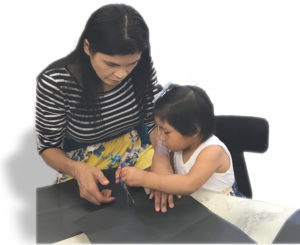Our Statement on Diversity, Equity, and Inclusion
 At the Pendleton Center for the Arts a diverse, inclusive, and equitable workplace is one where all board members, employees, instructors, volunteers, students, and guests feel valued and respected. We are committed to going beyond a nondiscriminatory approach and actively seeking out ways we can make opportunities in employment, artistic expression, volunteering, and participating open to those who have traditionally been marginalized. By seeking out diverse voices our work is energized.
At the Pendleton Center for the Arts a diverse, inclusive, and equitable workplace is one where all board members, employees, instructors, volunteers, students, and guests feel valued and respected. We are committed to going beyond a nondiscriminatory approach and actively seeking out ways we can make opportunities in employment, artistic expression, volunteering, and participating open to those who have traditionally been marginalized. By seeking out diverse voices our work is energized.
To achieve our objectives, we will consider several facets of our work:
- We will evaluate our board, staff, interns, and volunteers to identify voices that may be missing. Since Board and staff members often come from the pool of people who are already part of our PCA family, it is important to build diversity throughout the organization. When new board or staff positions arise, we will look for ways to bring new and diverse points of view into those leadership positions.
- We will continue to actively seek artists and exhibits that may challenge our thinking at times, and who also reflect a cross-section of the art world. A more inclusive approach will also guide the way we seek out and mentor craftspeople and creative entrepreneurs whose work we can sell in the Pendleton Foundation Trust Fine Craft Gallery. We will work to find emerging artists in the communities we serve, looking beyond the traditional venues (galleries, schools) to find creative people whose work expresses a voice and point of view that is under-represented.
- Our programs and classes will reflect our responsiveness to our broader communities and their make-up. We learned new things with our outreach efforts during the Covid-19 lockdown that should help us continue meeting people where they are, from using our digital platforms to make programming more accessible to delivering art supplies curbside at homes.
- We will continue to reach out to people and organizations through our students, patrons, and community leaders, seeking to engage people not often served by more traditional programs and services, such as veterans’ organizations, people with disabilities, and other underserved communities.
- As a board, we will regularly monitor our work and progress in achieving our objectives and adopt new strategies as needs arise. In doing so, we will seek input on what inclusiveness, diversity, and equity means to people involved with our programs. We will solicit fresh feedback on how we are meeting our objectives, while also exploring changes we can make in ourselves that will make participation easier for others.

A Note from the Executive Director
You may be seeing more and more conversations about the use of pronouns; how we refer to individuals in the third person, sometimes based on our own perception of their gender. You may have noticed pronouns listed after names on email signatures or on Zoom, or offered during introductions. Mine are she/her. For some that may seem hyper ‘woke’ or maybe a little odd or unfamiliar. For others, it creates an open, inclusive environment where they can share the pronouns *they* identify with.
Gender identity is sometimes static and may have been clear to someone since their first consciousness. Gender identity is sometimes fluid, and our own preconceived notions of someone else’s gender identity can be totally off base. By offering up how we’d best like to be referred to and welcoming that information from others, we make people feel valued. We make them feel seen.
Is that uncomfortable sometimes? Absolutely. But, good grief, marginalized people deal with enough discomfort, annoyance, and anxiety every day. I chalk up the discomfort I sometimes initially feel in navigating issues as a learning curve, and as the WORK of social justice. Using ‘they’ for an individual doesn’t always effortlessly roll off my tongue, but if making the effort makes the world better for others, it’s so worth it.
At PCA we work to make EVERYONE feel included and valued. We hope you always do.
Sincerely,
Roberta (she/her)
